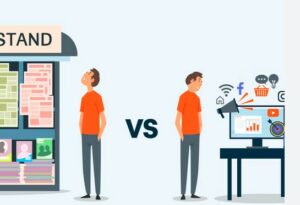In the age of social media, podcasts, and video content, blogging may seem like a relic of the past. However, this versatile medium has not only survived but evolved into a thriving and influential form of online expression. From its humble beginnings in the early days of the internet to its current status as a powerful platform for personal, professional, and societal discourse, blogging continues to shape the digital landscape. In this article, we’ll explore the evolution and enduring relevance of blogging in the digital age.

The Dawn of Blogging
Blogging’s origins can be traced back to the early 1990s when online diaries and journals began to appear on the World Wide Web. These personal weblogs allowed individuals to share their thoughts, experiences, and musings with a global audience. Bloggers, as they came to be known, were early pioneers of online self-expression.
The term “weblog” was eventually shortened to “blog,” and platforms like Blogger and WordPress made it easier for anyone to start their own blog. This democratization of online publishing marked a significant shift in how information was created and consumed on the internet.
Blogging as Personal Expression
At its core, blogging has always been about personal expression. Bloggers use their platforms to share their passions, expertise, and experiences. Whether it’s a travel blog chronicling adventures around the world, a food blog sharing culinary experiments, or a lifestyle blog discussing wellness and personal growth, blogs offer a space for individuals to explore their interests and connect with like-minded readers.
Blogging’s personal touch sets it apart from other digital mediums. Readers often form genuine connections with bloggers, feeling as though they are engaging in a conversation with a friend rather than consuming content from a faceless entity. This sense of intimacy and authenticity has been a driving force behind blogging’s enduring appeal.
The Evolution of Blogging Platforms
As blogging gained popularity, dedicated platforms emerged to cater to bloggers’ needs. Blogger, WordPress, Tumblr, and Medium are just a few examples of platforms that have provided bloggers with user-friendly tools for creating and publishing content.
Each platform offers a unique set of features, from customizable themes and templates to social sharing and comment moderation. These tools have empowered bloggers to create professional-looking websites without the need for extensive technical knowledge. As a result, blogging has become more accessible to a broader audience.
Professional Blogging and Monetization
In addition to personal expression, blogging has also evolved into a legitimate career path for many individuals. Professional bloggers, also known as influencers, have built substantial followings and monetized their blogs through advertising, sponsored content, affiliate marketing, and product sales.
Successful professional bloggers often specialize in niche areas, such as fashion, beauty, travel, or personal finance, and cultivate loyal audiences interested in their expertise. The rise of influencer marketing has made blogging a viable source of income for those who can effectively connect with brands and their target demographics.
The Impact of Blogging on Journalism
Blogging has disrupted traditional journalism by providing a platform for citizen journalists and independent voices. Bloggers can report on news, offer analysis, and share eyewitness accounts in real-time. This immediacy has made blogging an essential source of information during major events and crises.
Additionally, the ability to crowdsource information through blogs has led to a democratization of news reporting. Citizen journalists and bloggers have uncovered stories that mainstream media may have overlooked, shedding light on important issues and sparking conversations on a global scale.
Blogging’s Role in Social and Political Movements
Blogs have played a crucial role in social and political movements worldwide. From the Arab Spring to #BlackLivesMatter, bloggers have documented events, organized protests, and provided a platform for marginalized voices to be heard.
Blogging has been instrumental in raising awareness about social justice issues, advocating for change, and holding those in power accountable. The ability to bypass traditional gatekeepers has given bloggers a unique and influential role in shaping public discourse.
Blogging in Education and Thought Leadership
In the realm of education and thought leadership, blogging has become a valuable tool for sharing knowledge and ideas. Professors, researchers, and experts in various fields use blogs to publish academic insights, offer commentary, and engage with a broader audience beyond the confines of academia.
Blogging continues to grow across industries such as tech, marketing, and entrepreneurship. Thought leaders use blogs to share industry trends, strategies, and best practices, positioning themselves as experts and influencers in their respective fields.
Blogging in the Future
As we look to the future, blogging shows no signs of fading into obscurity. Instead, it continues to adapt to the changing digital landscape. Video blogs (vlogs), podcasts, and multimedia content have become integrated into many blogs, offering readers a variety of ways to engage with content.
Additionally, blogging remains a vital tool for individuals and businesses to establish their online presence. They can connect with their target audiences, and share their stories. There are always stories to tell, knowledge to share, and voices to hear. As such, blogging will continue to evolve and thrive in the digital age.
Conclusion
Blogging’s journey from its humble beginnings to its current prominence. This is as a multifaceted medium demonstrates its enduring relevance in the digital age. It has empowered individuals to express themselves. It has disrupted traditional media, contributed to social and political change. Blogging has facilitated knowledge sharing across industries.
